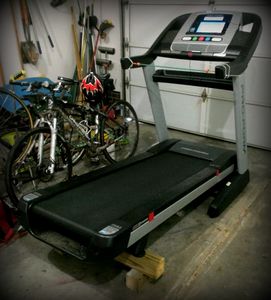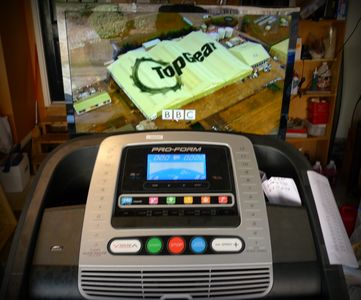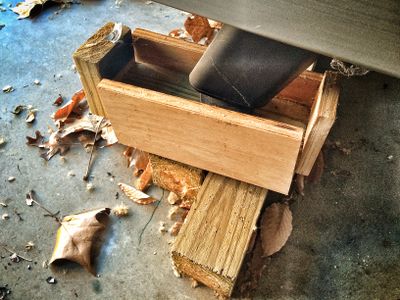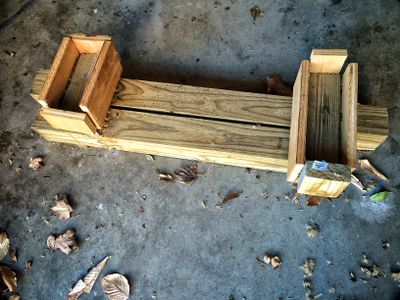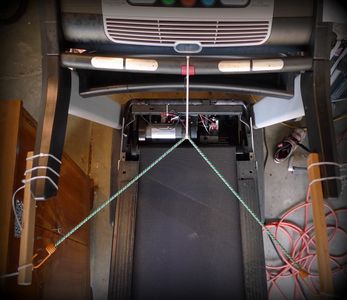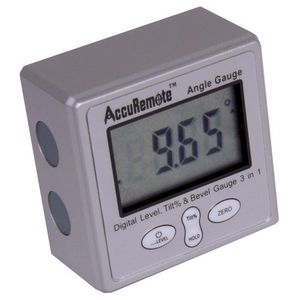Treadmill
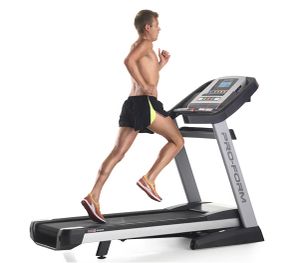
Using a treadmill can be wonderful or terrible, sometimes both at the same time. You may find yourself using the treadmill out of necessity when traveling, or you may need one for dealing with adverse weather. You may even decide that like me, you can improve your training by using the treadmill for downhill running or as a Treadmill Desk.
Contents
1 Advantages of a treadmill
- A treadmill allows you to run in a relatively comfortable environment regardless of the weather outside. This is a particular boon when there is snow and ice outside, or severe storms. In those conditions it may be impractical or dangerous to run outside.
- If you have to travel to a location where you can run, then a treadmill can save you time. If it's a 15 min. drive to your running location, then that's an extra 30 min. you can spend running (or doing something else).
- A treadmill can be used to ensure your running at a particular pace. Even with the Best Running Watch and Footpod it's tricky to be precise when running outside.
- Some treadmills can be used for Downhill Running, which is a great way of building up muscular endurance. With the treadmill you can go downhill from much further than is practical in most locations.
- It is possible to use a treadmill for Heat Acclimation Training, by raising the temperature in the room, or having a heater blowing directly on you.
- It's much easier to evaluate someone's Running Form when they are on the treadmill rather than outside.
2 Disadvantages of a treadmill
- One of the biggest disadvantages of a treadmill for many people is that you have to pay attention to where you are on the running belt. This prevents you from relaxing and finding Stillness in Motion.
- Treadmills can be quite inaccurate, so you need to perform Treadmill Calibration.
- Many people find that they have slightly different Running Form on a treadmill compared with running outside.
3 Which treadmill?
While I cannot review a wide variety of treadmills, I will share with you the treadmill I selected and the rationale I used. I was looking for a treadmill primarily for Downhill Running, and I wanted the cheapest treadmill that I felt would be strong enough to withstand the training stress I would put on it. I was not interested in any of the extra features such as programmable workouts, color display, or anything else that was not core to the functioning of the treadmill. After spending an inordinate amount of time in reading reviews, I selected the ProForm Pro 2000 based on the following thoughts:
- The ProForm Pro 2000 is highly rated in comparison reviews, and is a Best Buy for folding treadmills on ConsumerReports.org].
- This is one of the few treadmills that has a decline setting. The decline will only go down to 3%, and, like other treadmills that support decline, the speed is limited even at these modest declines. However, even this limited support gives me a little more confidence that the treadmill will survive doing more extreme declines with the back propped up.
- The ProForm Pro 2000 will go up to a 15% incline, and this range becomes valuable with the back propped up to allow for a wide range of angles.
- The weight limit for the treadmill is 350 pounds/160 Kg, which again gives me a little confidence that it will survive doing downhill runs as I only weigh 130 pounds/60 Kg.
- It is available from Amazon, a company I know and trust.
4 Living with the ProForm Pro 2000
Having lived with the ProForm Pro 2000 for a few months, I can make a few observations.
- I've found it a solidly built and effective product. This build quality does mean that it is large and heavy, so moving it is not trivial. Amazon claims that it has a shipping weight of 300 pounds, which seems about right.
- It was just as hard to put together as everybody says, taking two of those several hours of hard work. I'd recommend looking at the assembly instructions in the manual before you buy. It's expensive to have someone put it together for you, but it may be worthwhile depending on your mechanical aptitude.
- I propped the back of the treadmill up and have used it with the decline of up to 12%, and have done marathon length runs up to a 7% decline. I'm not sure if I will burn out the motor, but so far it's survived for a couple of years.
- The control board has gone bad twice so far, but I've had no other problems.
- My garage can get hot, so I leave the cover off the top of the treadmill and blow the motor with a fan.
- The built-in fan works better than I expected and it provides a useful level of cooling, but under hot conditions a larger fan is worthwhile.
- There is a small shelf for tablet PC and built-in speakers that are more or less adequate.
- The treadmill will automatically stop after 100 min. of use in manual, which is annoying. I've got used to this, and I can now restart the workout before the treadmill started to slow noticeably.
- The incline settings are not accurate. With the back propped up and the treadmill set to 15% incline, the platform is about 1% decline. However, setting the treadmill to flat does not give a 16% decline, only 12%. I use a digital angle meter (Error: Could not parse data from Amazon!) to measure the actual angle, but you could try a smartphone with the right app.
